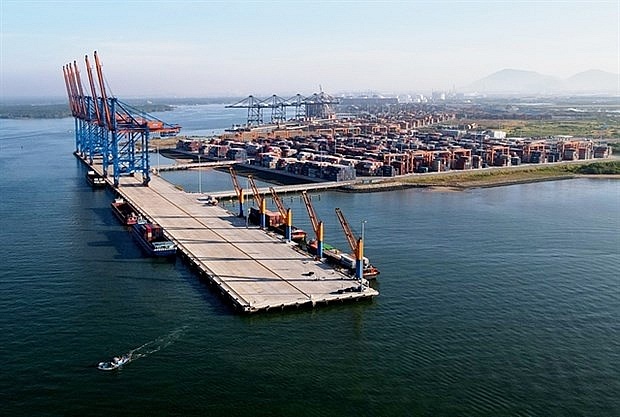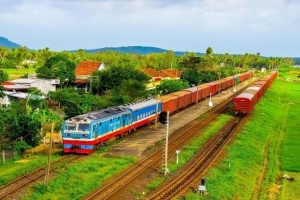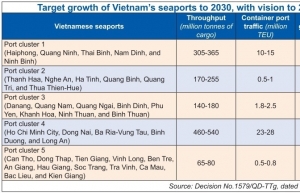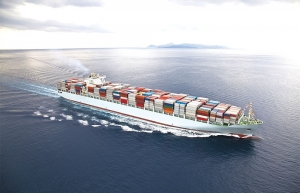Railway, seaport networks need to be arteries of economy: Deputy PM
 |
| Cai Mep-Thi Vai seaport cluster in the southern province of Ba Ria-Vung Tau. (Photo: VNA) |
Hanoi - The railway network connecting economic hubs and seaports needs to be designed as the key arteries of the economy, Deputy Prime Minister Tran Hong Ha said at a meeting with the Ministry of Transport and relevant departments on March 2.
The discussion focused on the planning, policies, solutions and resources to implement the railway and seaport planning for the 2021-2030 period, with a vision to 2050.
A report by the Ministry of Transport said that the goal is that by 2030, the network of seaports in Vietnam can handle up to 1.4 trillion tonnes of goods and 10.3 million passengers.
Around 33,600ha of land and 606,000ha of water surface are expected to be used to develop this network. The demand for investment by 2030 is about 313 trillion VND (13.2 billion USD).
This funding is expected to be mobilised from the private sector, among other sources. The State budget capital is focused on public maritime infrastructure and key economic areas.
Ha also proposed an overall review of the general, specialised and inland waterway ports for renovation, utilising the transportation potential of the dense river network across the country.
He added: “The railway network planning must not only stop at renovating and repairing, but follow a modern, comprehensive direction to respond to the development demands in the future.”
The roadmap also needs to be supported by in-depth studies for synchronised implementation of detailed plans.
Suggesting selecting one railway route to focus on, the Deputy PM asked the Ministry of Transport to work closely with the Ministry of Natural Resources and Environment for land use at intersections and stations.
He also asked the transport ministry to focus on several key railway and seaports projects in the 2023-2025 plan, while carefully reviewing and estimating investment resources, economic efficiency and the role of the State in the projects to be deployed in the following phase.
The railway network investment and development projects to 2023 are expected to make breakthroughs on the main routes of great demand, utilising its strengths in transporting a large volume of goods and passengers through medium and long distances.
The total demand for capital for the railway network by 2030 is estimated at about 240 trillion VND (10.1 billion USD), using the State budget as well as other sources.
After the master plans for the railway and seaport networks are approved by the Prime Minister, the transport ministry will actively implement the project, conducting evaluation after the first year, completing regulations and detailed plans, and allocating capital sources for the medium-term.
 | Boosting international railway transport investment The initial successes of the railway container transport network from Vietnam to Europe have provided a fulcrum inspiring the railway sector to increasingly engage with the international network. |
 | Seaport and logistics advances get European flavour Vietnam is seeking European experiences and support in developing seaport and logistics infrastructure projects, with opportunities available for investors who are showing increased interest in the Southeast Asian market. |
 | Investors seek seaport access improvements While having interest in seaport projects, both domestic and foreign companies are seeking better infrastructure access and development of quality distribution and logistics centres before making concrete plans. |
What the stars mean:
★ Poor ★ ★ Promising ★★★ Good ★★★★ Very good ★★★★★ Exceptional
Related Contents
Latest News
More News
- SLP supporting Vietnam in closing FDI-related gaps (January 26, 2026 | 10:06)
- UK–Vietnam partnership advances BIM centre for railway development (January 24, 2026 | 11:20)
- Nghe An issues criteria for Quynh Lap LNG plant selection (January 22, 2026 | 20:20)
- Vietnam as a manufacturing hub: why on-the-ground inspection matters (January 22, 2026 | 11:47)
- 14th National Party Congress: Building Hue into distinctive international cultural, tourism hub (January 22, 2026 | 09:27)
- British rail businesses strengthen cooperation in Vietnam (January 21, 2026 | 18:10)
- Vietnamese businesses step up plans for cybersecurity centres (January 21, 2026 | 11:09)
- AEON Mall injects additional $113 million into Vietnam unit (January 20, 2026 | 12:22)
- Canada pledges $81 million for initiatives in Vietnam (January 20, 2026 | 11:41)
- KK Group opens global flagship store in Ho Chi Minh City (January 19, 2026 | 11:52)

 Tag:
Tag:




















 Mobile Version
Mobile Version